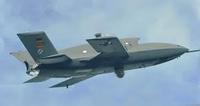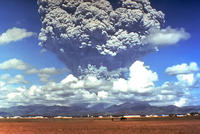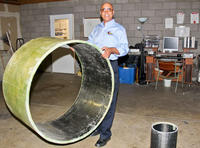-
No-till could help stabilize crop yields despite climate change
Reducing tillage for some Central Great Plains crops could help conserve water and reduce losses caused by climate change, according to studies at the U.S. Department of Agriculture
-
-
New camouflage makeup shields soldiers from searing heat of bomb blasts
The new camouflage makeup protects the face and hands for up to fifteen seconds before its own temperature rises to the point where a first-degree burn, which is a mild burn, might occur; in some tests, the new face paint can protect for up to sixty seconds, which could be important in giving soldiers time to move away from blast-related fires and also for use by civilian firefighters
-
-
ONR’s augmented-reality project progresses

The Office of Naval Research (ONR) yesterday demonstrated the next phase of an augmented-reality project which will change the way soldiers view operational environments — literally
-
-
Electronic nose detects airborne toxins down to the parts per billion level
Research create an electronic nose device with applications in agriculture, industry, homeland security, and the military; the device can detect small quantities of harmful airborne substances
-
-
Mystery of dramatic leveling off of methane in the atmosphere solved

Increased capture of natural gas from oil fields probably accounts for up to 70 percent of the dramatic leveling off seen in atmospheric methane at the end of the twentieth century; methane has twenty times the global warming potential of carbon dioxide, although CO2 is filling the atmosphere in far larger amounts
-
-
Engineering students build U.K. first hydrogen powered locomotive
Engineering students and staff at the University of Birmingham have designed and built a prototype hydrogen powered locomotive, the first of its kind to operate in the United Kingdom
-
-
Simple new test combats counterfeit drugs in developing countries
The World Health Organization (WHO) estimates that at least 10 percent of the drug supply in developing countries consists of counterfeit medicines, causing thousands of deaths every year; many of the deaths occur among people who unknowingly take counterfeit antibiotics and anti-malaria medicines that do not contain the active ingredient to combat those diseases; in addition to lacking the active ingredient, counterfeit medicines may harm people by containing ingredients that are potentially toxic
-
-
Border Patrol kiosk detects liars trying to enter U.S.

The U.S. Customs and Border Protection (CBP) is using border crossing stations in Arizona to test new technology to detect liars as they attempt to enter the country; travelers are subjected to a 5-minute interview with the kiosk, while microphones monitor vocal pitch frequency and quality, an infrared camera monitors eye movement and pupil dilation, and a high definition camera monitors facial expression
-
-
New device dismantles pipe bombs safely, preserving forensic evidence
Thousands of pipe bombs are made each year, and thousands of pipe bomb threats are called into local police and FBI authorities across the country; many are false alarms, but those that are not can be deadly; dismantling a pipe bomb is tricky and serious business, and missteps during the dismantling process can produce catastrophic results
-
-
Drone use spreads to more areas and missions

As security challenges in the United State and around the globe change, many countries have one thing in common: unmanned drones will be a significant part of the future of security; advancements in technology are driving the use of UAVs into newareas
-
-
World could be in for higher food prices
This has been one of the driest summers in American history, but the weather is not only affecting the United States; weak monsoons in India and other weather issues across the globe are affecting crops and could lead to higher food prices in 2013
-
-
Geoengineering clouds to slow global warming

Researchers are taking a second look at the possibility of using futuristic ships to shoot salt water high into the sky over the oceans, creating clouds that reflect sunlight and thus counter global warming; The theory behind idea, called “marine cloud brightening,” is that adding particles, in this case sea salt, to the sky over the ocean would form large, long-living clouds
-
-
Bacteria in tap water traced to the water treatment process
Most of the bacteria that remain in drinking water when it gets to the tap can be traced to filters used in the water treatment process, rather than to the aquifers or rivers where they originated; the findings could open the door to more sustainable water treatment processes that use fewer chemicals and, as a result, produce lower levels of byproducts that may pose health risks; eventually, the work could enable engineers to control the types of microbes in drinking water to improve human health
-
-
New technology combats global pandemic of drug counterfeiting
Drug counterfeiting is so common in some developing countries – in some studies, 50 percent of the drug samples from Southeast Asia have been counterfeit — that patients with serious diseases are at risk of getting a poor-quality drug instead of one with ingredients that really treat their illness
-
-
Aerospace materials for on-site building of pipes of infinite length

Concrete and steel pipes are built in short sections to fit on standard 18-wheel trucks; the heavy industrial manufacturing processes, long-distance trucking, and leak-prone joints used in steel and concrete pipe construction exact a heavy toll on the environment, not to mention bottom line; the solution: a new pipe design, consisting of a central layer of lightweight plastic honeycomb, which can be built onsite as a single section of virtually infinite length
-
More headlines
The long view
New Technology is Keeping the Skies Safe
DHS S&T Baggage, Cargo, and People Screening (BCP) Program develops state-of-the-art screening solutions to help secure airspace, communities, and borders
Factories First: Winning the Drone War Before It Starts
Wars are won by factories before they are won on the battlefield,Martin C. Feldmann writes, noting that the United States lacks the manufacturing depth for the coming drone age. Rectifying this situation “will take far more than procurement tweaks,” Feldmann writes. “It demands a national-level, wartime-scale industrial mobilization.”
How Artificial General Intelligence Could Affect the Rise and Fall of Nations
Visions for potential AGI futures: A new report from RAND aims to stimulate thinking among policymakers about possible impacts of the development of artificial general intelligence (AGI) on geopolitics and the world order.
Smaller Nuclear Reactors Spark Renewed Interest in a Once-Shunned Energy Source
In the past two years, half the states have taken action to promote nuclear power, from creating nuclear task forces to integrating nuclear into long-term energy plans.
Keeping the Lights on with Nuclear Waste: Radiochemistry Transforms Nuclear Waste into Strategic Materials
How UNLV radiochemistry is pioneering the future of energy in the Southwest by salvaging strategic materials from nuclear dumps –and making it safe.
Model Predicts Long-Term Effects of Nuclear Waste on Underground Disposal Systems
The simulations matched results from an underground lab experiment in Switzerland, suggesting modeling could be used to validate the safety of nuclear disposal sites.
